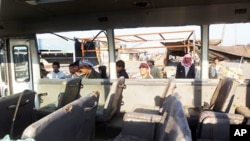Another wave of bombings against mostly Shi'ite targets in Iraq Thursday has left dozens dead and hundreds injured. At least six explosions shook Baghdad and another hit the southern city of Nasiriyah.
The series of bombings struck multiple targets in Baghdad and in the mostly Shi'ite heartland south of the capital. It was a day of bloodshed reminiscent of some of the worst bombing waves in recent years. Dozens were killed and dozens were wounded.
Iraqi security officials said four explosions hit the mostly Shi'ite slum of Sadr City and two explosions rocked the more well-to-do neighborhood of Kazimiyah. Witnesses reported that many of the casualties were poor Shi'ite workers.
The initial explosions took place during morning rush hour.
Later in the day, a suicide carbomber blew up dozens of Shi'ite pilgrims in the town of Nasiriyah. The violence comes as thousands of Shi'ite pilgrims from Iraq and elsewhere are heading toward the city of Karbala for next week's observance of Arbaeen, which marks the end of a 40-day mourning period for Imam Hussein, a revered Shi'ite figure.
The bomb attacks came just hours before Shi'ite Prime Minister Nouri al Maliki was due to meet Sunni parliament speaker Osama Nujeifi. The two men have been trying to find a solution to a political crisis which broke out when the Maliki government issued an warrant for Sunni Vice President Tareq al Hashemi.
.
Middle East expert Fouad Ajami of the Hoover Institution in California says the latest violence shows the weakness of the tenuous power-sharing agreement between Iraq's majority Shi'ite community and its increasingly marginalized Sunni brethren:
"It has to do with the death of the political process. It's a natural response when people despair of the political process, when there is no political process to speak of."
When the whole premise of power sharing in Iraq- I would look beyond this little explosion and that one - given the monopoly of power, and the grab for power so clearly manifest in the behavior of Nouri Maliki, then it becomes very difficult to keep faith in orderly politics. It becomes very difficult to keep faith that this country can be meaningfully shared, because I think it's obvious that Maliki believes that you can monopolize political power,” Ajami said.
Ajami says Iraq is feeling the impact of sectarian strife in neighboring Syria. He says Mr. Maliki is taking sides with the mostly Alawite government in Syria, as a popular, Sunni-dominated rebellion intensifies.
"When you look at what's happening in Syria, it triggers sectarian paranoia...the sectarian paranoia of Maliki is intensified, because he looks at Syria, a place he knew well, where he lived for 17 years in exile and he can look and see that a Sunni-ruled Syria would hold much attraction to the Anbar, to western Sunni Iraq," Ajami said.
Neighbors of Iraq and Syria are taking notice.
Turkish Foreign Minister Ahmet Davutoglu held a second day of talks in Iran Thursday, telling journalists that there is an increasing danger of sectarian strife in Syria "spreading to the rest of the region" and igniting a "regional Sunni-Shi'ite war."
| Join the conversation on our social journalism site - Middle East Voices. Follow our Middle East reports on Twitter and discuss them on our Facebook page. |




